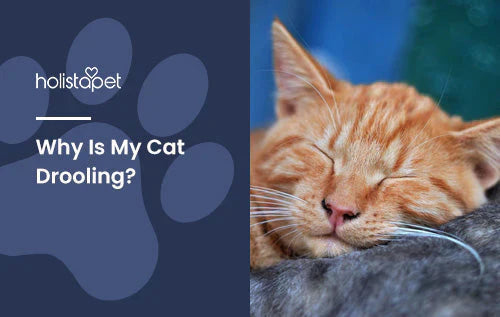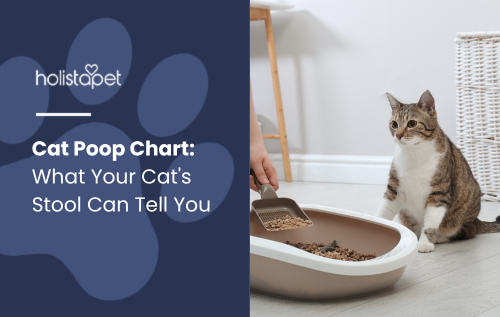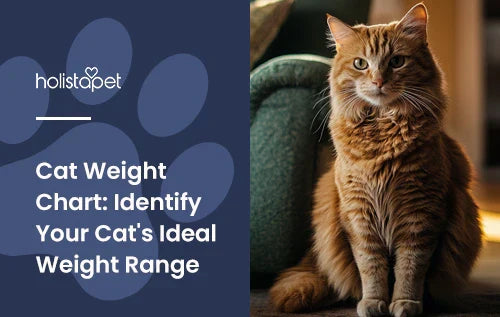We all have seen dogs drool excessively, so it shouldn't be a big deal with cats right? Unfortunately, cats should not drool as much as dogs do. It's important to find out why your cat is drooling. Excessive or abnormal drooling is often a sign of oral and gum disease, but sometimes it can be caused by excessive heat exposure, poison exposure, fear, or injury.
However, there are instances where drooling is absolutely normal for your cat such as when they are kneading or relaxing. It's important to understand the difference between normal drooling and excessive drooling. This will help you figure out if you should go to the vet or not.
Why Do Cats Drool?
There are many reasons why you notice your cat drooling a lot. Abnormal drooling can be a sign of oral and dental issue. Toxin exposure, stress, a lodged foreign object, and excessive exposure to heat are also common causes of excessive drooling. Cats are known to be experts at dealing with discomfort, and will not show that they are suffering until the situation is dire. Many times, a drooling cat is a sign for owners to identify that they are in discomfort, although they are not showing it.

Oral and Dental Complications
Gum complications, oral conditions, tooth injuries, ulcers in the mouth, and tooth issues can all lead to cats drooling abnormally. Animals are great at hiding their pain. This is because evolution has caused animals to feel like showing pain is displaying weakness to predators. Drooling is something that can't be hidden though.
Uncomfortable ulcers or tooth resorption cause drooling and inflammation. If you believe your cat has oral or dental disease, please visit the vet immediately. They have several methods to assist from professional cleanings to tooth removal.
Foreign Object
If a foreign object becomes lodged in your cat's mouth, it can cause abnormal drooling. The remnants of chew toys often get stuck in the mouth. Blades of grass, animal carcass, and string can all be culprits as well. If you open your cat's mouth and find a foreign object lodged somewhere, do not pull it out. Inspect the object first.
A string that is coming from the throat can be wrapped around an organ, and pulling it could cause painful damage. Immediately take your cat to the vet if you are in this situation. If the object is just lodged in the teeth or gums, you can use a toothpick to try and pry it free. Be careful not to knock the object back into your cat's throat.
Poison Exposure
Ingesting or licking poisonous material can cause your cat to drool abnormally. Poisonous materials can range from insect sprays to toxic plants. Flea and tick preventatives made for dogs can be toxic for cats as well. Exposure to poison can be deadly, and owners should take their cat to the vet if they believe toxins are the cause of drooling.
Related: Cat Hairball Home Remedies [Top 12 Tips]
Injury
Trauma to the mouth can cause your cat to salivate excessively. For example, a can with a broken jaw will drool abnormally. Chewing electoral cords, eating or biting prey that is spiked, and accidental tooth removal are all injuries that cause excessive drooling. Many times, owners will not be able to see the injury in the mouth prior to noticing the drooling.
Nausea
Vomiting and nausea can lead to abnormal drooling. The root of the vomiting and nausea should be the owner's main concern. Gastrointestinal ailments, kidney disease, and diabetes can all cause feelings of nausea in your cat. The best thing to do if your cat is vomiting or nauseous is to see the vet. Nausea in cats can be identified by excessive meowing which typically accompanies abnormal drooling.
Heatstroke
Heatstroke is more common in cats with flattened faces, such as Persian cats. Dehydration and heatstroke can lead to abnormal drooling. Make sure you are supplying enough water for your cat, and it is drinking regularly. Also, give your cat a space where there is some shade to escape the sun.
Stress or Fear
Did you know that stress and fear can cause excessive drooling? Stress can be caused by the introduction of a new pet to the environment, moving apartments or houses, getting a new roommate, loud noises, separation fear, or flashing lights. A cat's fear can be caused by a long list of factors such as car rides, vet visits, a perceived predator being introduced to the home (like a dog), and excessive noise.
Typically, drooling in these circumstances is temporary and stops once the stress or fear factor has been removed from the environment. Your cat should become acclimated to a new roommate or a new dog over time.
Is It Normal For Cats To Drool?
It is not typical for cats to drool, however, some felines will drool while they are kneading or purring. Cats do not usually drool when they smell something delicious or see food, as dogs do. But, if your cat does salivate before a meal, or when a delectable smell lingers in the air, there is nothing to worry about.
Drooling can also occur when your cat is ultimately relaxed or content. This is connected to how cats nurse. When they are kittens, felines will knead their paws on their mother's stomach to signal that they are hungry. The kneading helps the release of milk from the mother as well. As kittens get older, they start kneading in their environment while relaxing. Because that reflex was originally tied to nursing, some cats will salivate when kneading.
Just like we salivate when we get nauseous, a cat might salivate before it regurgitates a hairball. It's not a pretty sight but it is normal for cats to spit up hairballs from time to time. If you notice your cat is drooling before or after it hurls up a hairball don't be alarmed. However, if your cat is having trouble passing a hairball or experiencing discomfort from it you should be concerned and may need to go to the vet.

When is Drool Not Normal?
If your cat is constantly drooling, there may be a problem. This is especially true if the drooling does not appear to occur around joy or eating. Owners should contact their vet if they believe their cat is excessively drooling. Once again, your cat should not drool with the same frequency or intensity as dogs. Drooling can also be a sign of a medical issue.
Dental conditions or irritation in the mouth can lead to excessive drooling. If you lift your cat's lips and notice brown and yellow teeth with red or swollen gums, that could be the cause of the drooling. Another sign you will surely pick up on if your cat has dental problems is foul breath. A cat's bad breath can also signal respiratory issues, which is another reason your cat may drool.
Some respiratory conditions and oral complications also cause excessive drooling in cats, but if this is the case you will need to get professional advice and confirmation from your veterinarian. Stress and fear can also cause a cat to drool abnormally. Although stress can be a common problem amongst cats it is not normal.
Just like with us, prolonged stress in cats can lead to a multitude of medical issues. As we know cats are curious, some love toys and hunting. Sometimes a cat will get a piece of a chew toy or prey stuck in their teeth or throat. Naturally, they will salivate to try and "wash" away the lodged item.
Related: What Can I Give My Cat for Pain Relief?
Symptoms Of Abnormal Drooling in Cats
Abnormal drooling in cats can be identified as salivation that doesn't appear connected to relaxation, joy, food, or an occasional hairball. Random, seemingly unnecessary, and consistent drool can leave your cat's chin soaked. Oftentimes excessive salivation is the symptom of a much bigger issue. Take your cat to the vet if you believe your pet is excessively drooling. If you do not brush your cat's teeth or provide them with dental cleaning of any kind, the abnormal drooling is most likely caused by an oral or dental complication.
Related: #1 CBD Calming Chews For Dogs
When Should You Go to the Vet?
Owners should do their best to care for their cats and take them to the vet for regular checks ups. Vets can help you diagnose issues before they become serious. If your cat has started to drool excessively, check their gums. Look to see if there is inflammation or an object lodged in their mouth. If it is something you can deal with at home, such as a piece of grass lodged in the gums, there is no need to call the vet.
If you notice swollen gums, blood, string coming from the throat, or any of the other causes listed above. it is best to contact your vet immediately. Remember, it is natural for your cat to drool when pleased, relaxing, or eating. The real concern should only arise when drooling becomes excessive, random, or constant.
Related: CBD oil for cats
Final Thoughts
We understand that owners are concerned about the health of their pets. Moderate drooling is normal though, and owners should have no worries if their cat is doing it. If you observe your cat drooling without stimulation, then it's time to check in to see why do cats dribble. Stay up to date with vet visits and pay attention to your pet, those two things alone can help prevent most of the causes of abnormal drooling. Look over here for more info.
Frequently Asked Questions
Can certain cat breeds be more prone to drooling than others?
Yes, some cat breeds, especially brachycephalic (flat-faced) breeds like Persians and Himalayans, are more likely to drool due to the unique structure of their skulls. These breeds can have issues with breathing, swallowing, and regulating temperature, all of which can contribute to increased salivation. While this doesn't always indicate a medical problem, any sudden increase in drooling should still be evaluated by a vet.
Can medications cause my cat to drool?
Absolutely. Certain medications, especially those given orally or topically near the mouth, can cause drooling as a side effect. Bitter-tasting meds or those that irritate the mucous membranes may lead to a cat salivating more than usual. If your cat starts drooling after a new medication, consult your vet to determine if a dosage change or alternative medication is needed.
Is drooling ever a sign of a neurological issue in cats?
Yes, although it’s rare, neurological disorders can cause cats to drool. Conditions affecting the nerves that control swallowing or facial muscles might lead to difficulty managing saliva. Symptoms might include drooping on one side of the face, trouble walking, or unusual eye movement. If neurological signs accompany drooling, prompt veterinary care is essential.
Can dental treats or chews help reduce drooling?
Yes, dental treats designed to clean teeth and gums can help reduce drooling caused by mild oral irritation or plaque buildup. These chews promote better oral hygiene, which in turn can reduce inflammation and excessive salivation. However, they are not a substitute for professional dental cleanings if a cat already has significant dental disease.
How can I prevent my cat from chewing on harmful items that might cause drooling?
Cat-proofing your home is crucial. Keep small items like string, rubber bands, electrical cords, and toxic plants out of reach. Provide plenty of safe toys and rotate them to keep your cat engaged. If your cat is prone to chewing on inappropriate items, consider using deterrent sprays or enriching their environment with puzzle feeders and climbing structures.
Does age affect how likely a cat is to drool excessively?
Yes, age can play a role. Older cats are more prone to dental issues, kidney disease, and other conditions that may cause drooling. As cats age, their grooming habits might also decline, making it easier to miss early signs of illness. Regular senior wellness exams are key to catching age-related health issues early, including those that cause abnormal drooling.
Can teething cause drooling in kittens?
Definitely. Kittens typically start teething around 3 to 6 months of age, and drooling is a common symptom during this time. It may be accompanied by light chewing on objects or slight discomfort. This type of drooling is temporary and should stop once adult teeth are fully in. If the drooling is severe or accompanied by bleeding or loss of appetite, a vet visit is still recommended.
Can grooming products cause my cat to drool?
Yes, some grooming products like shampoos, flea treatments, or sprays can cause drooling if your cat licks them off their fur. Ingredients that are safe for external use may still irritate the mouth or digestive system if ingested. Always use cat-safe grooming products and follow instructions carefully. If drooling starts after grooming, rinse your cat with plain water and call your vet if symptoms persist.
Is drooling ever related to allergies in cats?
While not very common, cats can have allergic reactions that lead to drooling, especially if the allergen irritates the mouth or throat. This might happen if your cat chews on a plant or ingests something they’re sensitive to. Other signs like sneezing, swelling, or itchy skin often accompany allergy-related drooling. Consult your vet to help identify the allergen and recommend a treatment plan.
Can dental surgery or extractions cause temporary drooling?
Yes, after dental procedures like tooth extractions or deep cleanings, cats may drool for a short period during recovery. This drooling usually subsides as the mouth heals. However, if your cat continues to drool excessively, stops eating, or shows signs of pain days after surgery, follow up with your veterinarian to rule out infection or complications.
Could my cat be drooling because of a bad taste or something stuck in its teeth?
Definitely. A foul taste—such as from spoiled food, chemicals, or medications—can cause temporary drooling. Similarly, food particles or fur trapped between teeth can trigger excessive salivation. If the drooling stops shortly after the taste or object is removed, it’s nothing to worry about. Persistent issues, however, should be checked by a vet.
Is it normal for cats to drool in their sleep?
Occasional drooling during deep sleep or naps, especially when a cat is very relaxed, can be normal. You might notice a small damp spot where they were lying. However, if this happens frequently or the drool smells foul or is discolored, it could point to an underlying issue that warrants a vet checkup.
What should I do if my cat starts drooling suddenly and pawing at its mouth?
Sudden drooling combined with pawing at the mouth is often a sign of acute discomfort or distress—possibly from something stuck, a sting, or an oral injury. Try to gently inspect the mouth if your cat allows it, but do not force it open. If you can’t determine the cause or see anything alarming, contact your vet right away for guidance and a proper examination.


 CBD Oil for Cats - Fast Acting
CBD Oil for Cats - Fast Acting
 CBD Cat Treats - Easy Dose
CBD Cat Treats - Easy Dose
 CBD Calming Chews for Cats - Highly Rated
CBD Calming Chews for Cats - Highly Rated
 CBG Oil for Dogs and Cats - Loved by Thousands
CBG Oil for Dogs and Cats - Loved by Thousands





Leave a comment
All comments are moderated before being published.
This site is protected by hCaptcha and the hCaptcha Privacy Policy and Terms of Service apply.